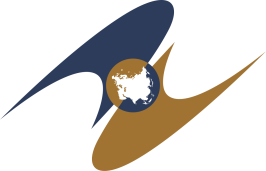Extending mutual cooperation, increasing trade volumes, establishing an integration dialogue between regional associations, and identifying areas of potential business partnership were the key issues during the session “EAEU-Africa: Horizons of Cooperation”, held within the Second Russia-Africa Economic and Humanitarian Forum on July 27 in St. Petersburg.
Sergei Glazyev, Minister in charge of Integration and Macroeconomics of the Eurasian Economic Commission, noted significant progress in cooperation between the Eurasian Economic Union and African countries after the first Russia-Africa Forum in 2019. He listed agriculture and infrastructure, mutual trade and investment, integration of information systems, cooperation in technical regulation, veterinary and phytosanitary control, and entrepreneurial development as priority sectors for interaction.
As Sergei Glazyev stressed, addressing food security issues could become a driver that would take the EAEU-Africa cooperation to a new level.
“The EAEU aggregate capabilities to manufacture basic food products and mineral fertilizers, in fact, can provide resources to feed almost one billion people,” Sergei Glazyev noted.
Besides, the EEC Minister drew his African colleagues’ attention to the Commission’s successes in implementing integration projects and declared his determination to share experience in achieving the UN Sustainable Development Goals. At the same time, according to him, the integration experience of African subregional associations is of interest to the Eurasian region.
“In terms of substantive work, the exchange of best integration practices could be of interest,” Sergei Glazyev stated. “We are able to quickly raise the understanding of the conditions of the EAEU single market functioning, especially in terms of technical regulation, and special aspects of applying sanitary and phytosanitary measures.”
Developing the theme of sharing best integration practices, the EEC Minister emphasized that Africa was ahead of many countries in digitization, especially in the financial sphere, which could be of practical interest in developing integration within the EAEU.
The EEC Minister also stated the importance of dialogue with the African Union and further development of the legal framework for interaction between the two associations by prolonging the Memorandum of Understanding, establishing practical work, and exchanging best integration practices.
Dmitry Volvach, Deputy Minister of Economic Development of the Russian Federation, noted the growth of mutual trade, the volume of which increased by 60% from 2015 to 2022 and amounted to 19 bln US dollars, including the EAEU countries’ exports increased by 74% and imports grew by 15.5%. Dmitry Volvach believes that the key objective is to identify the untapped potential of trade and economic cooperation and develop mechanisms for its fulfilment. He also noted the growing interest of African countries in the Eurasian integration agenda and informed on the prospects of the EAEU interaction with both countries and international organizations and associations of the continent through institutionalization of cooperation and conclusion of memoranda between the EEC and key regional international associations of the African continent.
Marie Therese Chantal Mfula Edjomo, Commissioner for Territorial Development and Infrastructure of the Commission of the Economic Community of Central African States (ECCAS), reported on the Community’s activities, noting the formalization of direct dialogue with the Commission and the exchange of best practices in the format of seminars as promising areas for developing the integration agenda between the EEC and the ECCAS Commission. She drew attention to the progress in implementing the climate agenda and green economy projects, as well as shared plans to improve the business climate in the region, calling for more active investment in the economies of the community’s member countries.
Steve Patrick Lalande, Director of the Partnership Development and Resource Mobilization Department of the African Union (AU) Commission, stressed the growing number of working issues between the EEC and the AU Commission and called for joint forums, field meetings, and seminars to more actively exchange positive integration experiences in the field of regulation, investment attraction, business community awareness, small and medium business promotion, and education development.
Alexander Shokhin, President of the Russian Union of Industrialists and Entrepreneurs, spoke in praise of the trade index between the Eurasian Economic Union and the African region and proposed to more actively develop the logistics base on the continent to ensure the growth of mutual trade between the EAEU and African countries. He also dwelled on the prospects for cooperation between the EAEU Business Council and business circles of African countries.
The event was moderated by Oleg Ozerov, Ambassador-at-Large and Head of the Secretariat of the Russia-Africa Economic and Humanitarian Forum.
For reference
The Economic Community of Central African States (ECCAS) was established in 1983. This integration association is composed of Angola, Burundi, Gabon, DRC, Cameroon, Republic of the Congo, Rwanda, Sao Tome and Principe, Central African Republic, Chad, and Equatorial Guinea. The declared objectives of the organization are to develop integration processes between the participating countries, to promote their comprehensive enhancement based on their own economic forces, and to move towards the creation of a common market. The ECCAS also works to enhance peace and stability, combat terrorism and piracy, and support electoral processes in the community space.
The African Union (AU) was established in 2002. The declared objectives of the AU are to defend the sovereignty, territorial integrity and independence of its Member States, to enhance peace, security and stability, to accelerate the political and socio-economic integration on the continent, to promote democratic principles and institutions, to promote concerted approaches of African countries on the global stage, and to establish the necessary conditions which enable Africa to play its rightful role in the global economy.
In 2021, the foreign trade turnover of the EAEU with African countries increased by 21.9% (up to 18.9 bln US dollars), exports grew by 24% (up to 15.4 bln US dollars, and imports increased by 13.7% (up to 3.5 bln US dollars).
The Memorandum of Understanding between the Eurasian Economic Commission and the African Union Commission was signed on October 24, 2019 as part of the Russia-Africa Summit in Sochi.























